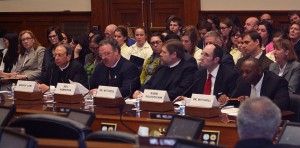The claim that the Federal Reserve is insulated from politics has always been a farce. Greenspan did a number of ideologically inconsistent things that just happened to help Republicans. And given that the banks run the Fed, it would be impossible to say it is isolated from the politics of the MOTUs (which is increasingly the politics of Congress, anyway).
Nevertheless, when a transpartisan group threatened to require Fed audits during the Dodd-Frank debates, people on both sides of the aisle objected because it would politicize the Fed.
No such worries for the top four Republicans, I guess.
Dear Chairman Bernanke,
It is our understanding that the Board Members of the Federal Reserve will meet later this week to consider additional monetary stimulus proposals. We write to express our reservations about any such measures. Respectfully, we submit that the board should resist further extraordinary intervention in the U.S. economy, particularly without a clear articulation of the goals of such a policy, direction for success, ample data proving a case for economic action and quantifiable benefits to the American people.
It is not clear that the recent round of quantitative easing undertaken by the Federal Reserve has facilitated economic growth or reduced the unemployment rate. To the contrary, there has been significant concern expressed by Federal Reserve Board Members, academics, business leaders, Members of Congress and the public. Although the goal of quantitative easing was, in part, to stabilize the price level against deflationary fears, the Federal Reserve’s actions have likely led to more fluctuations and uncertainty in our already weak economy.
We have serious concerns that further intervention by the Federal Reserve could exacerbate current problems or further harm the U.S. economy. Such steps may erode the already weakened U.S. dollar or promote more borrowing by overleveraged consumers. To date, we have seen no evidence that further monetary stimulus will create jobs or provide a sustainable path towards economic recovery.
Ultimately, the American economy is driven by the confidence of consumers and investors and the innovations of its workers. The American people have reason to be skeptical of the Federal Reserve vastly increasing its role in the economy if measurable outcomes cannot be demonstrated.
We respectfully request that a copy of this letter be shared with each Member of the Board.
Sincerely,
Sen. Mitch McConnell, Rep. John Boehner, Sen. Jon Kyl, Rep. Eric Cantor
Especially nice is that McConnell’s signature is first. You know, the guy who has said his single most important goal is to make Obama a one-term President?
To be fair, there are reasons to oppose QE3, which is the most likely form any Fed intervention would take. Masaccio described last year, for example, how it hurts savers. So it’s not that I’m sure QE3 would do anything but goose the stock market. But I am shocked that more people aren’t objecting to this naked political ploy.
Further, these Republicans pretend that the Fed doesn’t already have a clear mandate to do something about the economy. Mind you, the Fed has mostly forgotten itself that, in addition to “maintaining stable prices” it is supposed to achieve maximum employment. But it is part of its charter to pursue policies that will bring unemployment down from 10%.
That seems to be precisely what the Republican leadership is trying to prevent.
These boys have blatantly broken one of the rules of the Village, which is that it at least pretend that politics is not directing the Fed. Thus far, though, the Village wailers have not yet commented on it.
Update: Now that I note the coincidence, I wonder whether Lamar Alexander’s letter announcing he was stepping down from his leadership position–sent the same day as the leadership letter to Bernanke–is more than a coincidence. After all, the decision amounted to an admission that Republican partisanship was impeding actual useful policy. His letter focused on the Senate, mind you, not on inappropriate interventions in the Fed. Still, I wonder whether this was a factor?





